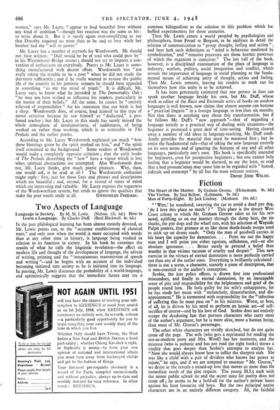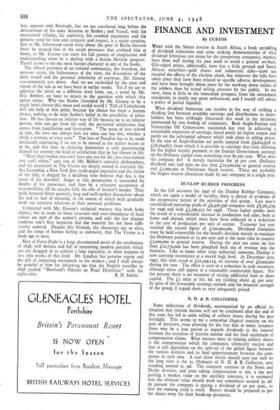Fiction
Men of Forty-Eight. By Jack Lindsay. (Methuen. 10s. 6d.)
"WHY,' he wondered, swerving the car to avoid a dead pye dog, 'do I love this place so much ' ? ' This place is the dreary West Coast colony to which Mr. Graham Greene takes us for his new novel, uplifting us on our journey through the damp heat, the tin shacks, the pye dogs and the wharf rats, with his selection of Wayside Pulpit posters, that grimace at us like those death-heads troops used to stick up on desert roads. "Only the man of goodwill carries in his heart the capacity for damnation. . . . Point me out the happy man and I will point you either egotism, selfishness, evil—or else absolute ignorance. . . . Better surely to pretend a belief than wander in that vicious vacuum of cruelty and despair." This new exercise in the virtues of eternal damnation is more perfectly carried out than any of the earlier ones. Everything is brilliantly calculated ; there is not a scene, a character, scarcely a piece of description, that is non-essential to the author's conception.
Scobie, the just police officer, is drawn first into professional misconduct, and finally to eternal damnation, by an inescapable sense of pity and responsibility for the helplessness and grief of the people round him. He feels guilty for his wife's unhappiness, for he has made her mean with "melancholy, dissatisfaction, and dis- appointment." He is tormented with responsibility for the "infection of suffering that he must pass on" to his mistress. Worst, or best, of all, he is driven by his need to perform an heroic act—of self- sacrifice of course—and by his love of God. Scobie does not entirely escape the deadening fate that pursues characters who carry most of the author's argument, but he is more alive, more a human being, than most of Mr. Greene's personages.
The other white characters are vividly sketched, but do not quite come off the page. The wife (who gets a reprimand for reading the not-so-modern poets and Mrs. Woolf) has her moments, and the mistress (who is pathetic and has not read the right books) shows a vitality that goes deeper than Scobie's attempts to analyse her. "Now she would always know how to inflict the sharpest stab. She was like a child with a pair of dividers who knows her power to injure," he says, and if we are tempted to murmur "Mr. Greene," we desist as she reveals a mixed-up love that moves us more than the immediate needs of the plot require. The young M.I.5 nark with the minor public school tie and the secret taste for poetry does not come off ; he seems to be a hold-all for the author's private hates against his least favourite old boys. But the two principal native characters are in an entirely, different category. Ali, the faithful boy, appears only fleetingly, but we are convinced long before the denouement of his utter devotion to Scobie ; and Yussef, with his unashamed villainy, his sophistry, his crooked arguments and his genuine need for love and company and respect, is a major creation. Just as Mr. Isherwood could write about the poor of Berlin because there he seemed free of the social pressures that confined him at home, so Mr. Greene can exert his full powers of imagination and understanding when he is dealing with a Syrian Moslem gangster. Yussef seems to me the most human character in any of the books.
The inbred pettiness of an isolated community, the boredom, the nervous strain, the hideousness of the view, the discomfort of the daily round and the personal inferiority of everyone, Mr. Greene consummately sets down. And we are enthralled by the pace and vigour of the tale as we have been in earlier works. Yet if we are to appraise the novel on a different level from, say, a novel by Mr.
Eric Ambler, we have to return to the question with which this nptice opens. Why has Scobie (intended by Mr. Greene to be a tragic hero) chosen this mean and sordid world ? Talk of Catholicism will not help at this point, because the choice has been a human choice, nothing to do with Scobie's belief in the possibility of salva- tion. He has chosen an inferior way of life because he is an inferior person, who can get from life only the perverted satisfaction that comes from humiliation and frustration. "The sense of love stirred
in him, the love one always feels for what one has lost, whether a
child, a woman, or even pain." The loss of Paradise has to be made artistically convincing if we are to be moved as the author means us to be, and this hero in choosing damnation is only guaranteeing himself for eternity the kind of satisfaction that he has chosen in life. "More than human you can't have any use for life; less than human you can't either," says one of Mr. Bellow's cafeteria philosophers, and the characters in The Victim are deeply rooted in everyday life.
Asa Leventhal, a New York Jew, trade-paper journalist and the victim of the title, is dogged by a deadbeat who believes that Asa is the cause of his downfall. Anger at this persecution is succeeded by doubts of his innocence, and then by a reluctant acceptance of responsibility, till he accepts fully the role of brother's keeper. They hold, between bitter quarrels, long and well-spoken discussions about life and its lack of meaning, in the course of which both gradually work out tentative solutions of their personal problems.
Compared with Mr. Greene's technical mastery this book looks clumsy, but in truth its loose structure and over-abundance of local colour are part of the author's pattern, and only the last chapter confirms one's first suspicion that the material has not been suffi- ciently ordered. Despite this blemish, the characters are so alive, and the range of human feeling so extensive, that The Victim is a book nest to miss.
Men of Forty-Eight is a long, documented novel of the revolutions of 1848, well written and full of interesting modern parallels which
are not dragged in to achieve a false topicality, as often happens in less able works of this kind. Mr. Lindsay has genuine vigour and the gift of imparting excitement to his readers ; and I shall always be grateful to him for informing me that the English traveller in 1848 packed " Rowland's Odonto or Pearl Dentifrice" with his



































 Previous page
Previous page